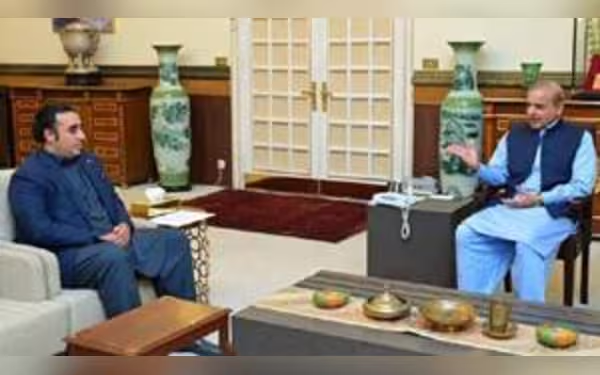Thursday, November 7, 2024 06:38 AM
PPP Criticizes PML-N Over Judicial Commission Representation
- PPP claims JCP representation is imbalanced.
- Bilawal withdraws from JCP nominations.
- Upcoming CEC meeting to address concerns.
 Image Credits: nation_pk
Image Credits: nation_pkPPP expresses dissatisfaction with PML-N over JCP representation, leading to Bilawal's withdrawal from nominations.
The political landscape in Pakistan is often marked by alliances and disagreements, and the recent tensions between the Pakistan People’s Party (PPP) and the Pakistan Muslim League (Nawaz) (PML-N) highlight this dynamic. The issue at hand revolves around the composition of the Judicial Commission of Pakistan (JCP), which has become a point of contention between these two key political parties. The PPP has expressed its dissatisfaction with what it perceives as an ‘imbalanced’ representation in the JCP, a body that plays a crucial role in the appointment of judges and the administration of justice in the country.
According to sources, the PPP's concerns were formally communicated to Prime Minister Shehbaz Sharif by Bilawal Bhutto Zardari, the party's chief. The PPP argues that the current representation does not honor the agreement made between the two parties, which stipulated equal representation in the JCP. Bilawal has reportedly stated that the government “has not honoured its commitment” regarding this matter. This disagreement has led to significant developments, including the withdrawal of Bilawal’s name from the JCP nominations.
The crux of the PPP's grievance lies in the inclusion of the Attorney General and the Law Minister, both of whom are affiliated with the PML-N, as members of the JCP. The PPP contends that their presence undermines the principle of equal representation that was initially agreed upon. Following these differences, Bilawal’s nomination was retracted, resulting in PPP leader Farooq H. Naek stepping in to represent the party in the JCP.
As the situation unfolds, nominees from both the National Assembly and the Senate have been submitted to the Supreme Court. Acting President Syed Yousaf Raza Gillani has directed the Supreme Court’s Registrar to process these nominations based on recommendations from key political figures, including Leader of the House Senator Ishaq Dar and Leader of the Opposition Senator Shibli Faraz. The current list of members includes Senator Farooq H. Naik from the PPP and Senator Shibli Faraz from the opposition, alongside other notable figures such as opposition leader Omar Ayub Khan and Sheikh Aftab from the PML-N. Additionally, Roshan Khorasani Brocha has been nominated for the reserved seat for women in the JCP.
It is important to note that the recent approval of the 26th Amendment allows for five members from parliament to be included in the Judicial Commission, which adds another layer of complexity to the ongoing discussions. The PPP plans to address these issues in an upcoming Central Executive Committee (CEC) meeting after Bilawal returns from his trip abroad. A senior PPP leader expressed hope that the PML-N would adhere to the original agreement and work towards a resolution, stating, “We will decide on how to move forward after the CEC meeting. Hopefully, the PML-N will abide by the agreement and find a solution.”
This situation serves as a reminder of the delicate balance of power and the importance of collaboration in Pakistan’s political framework. As the PPP and PML-N navigate their differences, the outcome will not only affect their relationship but also the broader political climate in the country. The resolution of this issue could set a precedent for future collaborations and agreements between political parties, emphasizing the need for transparency and mutual respect in governance.













